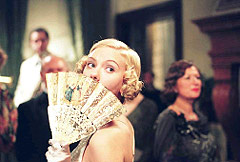
| HOME |
| NERVE |
| REVIEWS |
| ARCHIVE |
| EVENTS |
| LINKS |
| ABOUT US |
| CONTRIBUTORS |
| BACK ISSUES |
| CONTACT US |
 A Good
Woman (U)
A Good
Woman (U)
Written by Oscar Wilde and Howard Himelstein, Directed by Mike Barker
Screening at FACT from 3rd-9th June 2005
Reviewed by Adam Ford
I like a Wildeism as much as anyone. I mean...'A man can be happy with any woman as long as he does not love her'. Are you nodding sagely? 'America had often been discovered before Columbus, but it had always been hushed up'. Are you chuckling? Yeah, it's a good one. But imagine living with him, and he came up with paradox after paradox 24/7! He'd be all like ‘Another biscuit? Well, I can resist everything but temptation'. And ‘Oh Adam, you don't agree do you? It's just that whenever people agree with me I always feel I must be wrong’. And I'd be all like 'I'm gonna slap you so hard'. Unfortunately, his Lady Windermere's Fan - the play that this film was based on - is populated with aristocratic characters who seem to be little more than vehicles for his witticisms. And if that's not infuriating enough, Himelstein seems to have borrowed some from other Wilde plays, such as the far superior The Picture Of Dorian Gray.
It's summer season in the early 1930s, and so the lords and ladies of
England are going to the coast of Italy with the business class of the
US to shake off their great depressions. The lovey-dovey Windermeres (Scarlett
Johansson and Mark Umbers) have been married for a year, and seem to be
enjoying an everlasting honeymoon. But that’s before they meet gold-digging
seductress Mrs Erlynne (Helen Hunt), who has a skeleton in her closet
and her sights set on Lord Windermere.
This isn’t a terrible film by any means. The Mediterranean scenery
is stunning, and the always earnest Tom Wilkinson is magnetic as the good-natured
but somehow tragic ‘Tuppy’. Unfortunately, the rest of the
cast seem to be merely basking in the glow of the sunshine, the frocks
and the bon mots. And Wilde’s incessant cleverness is so annoying!
But then as the man himself said, ‘The public is wonderfully tolerant.
It forgives everything except genius’.